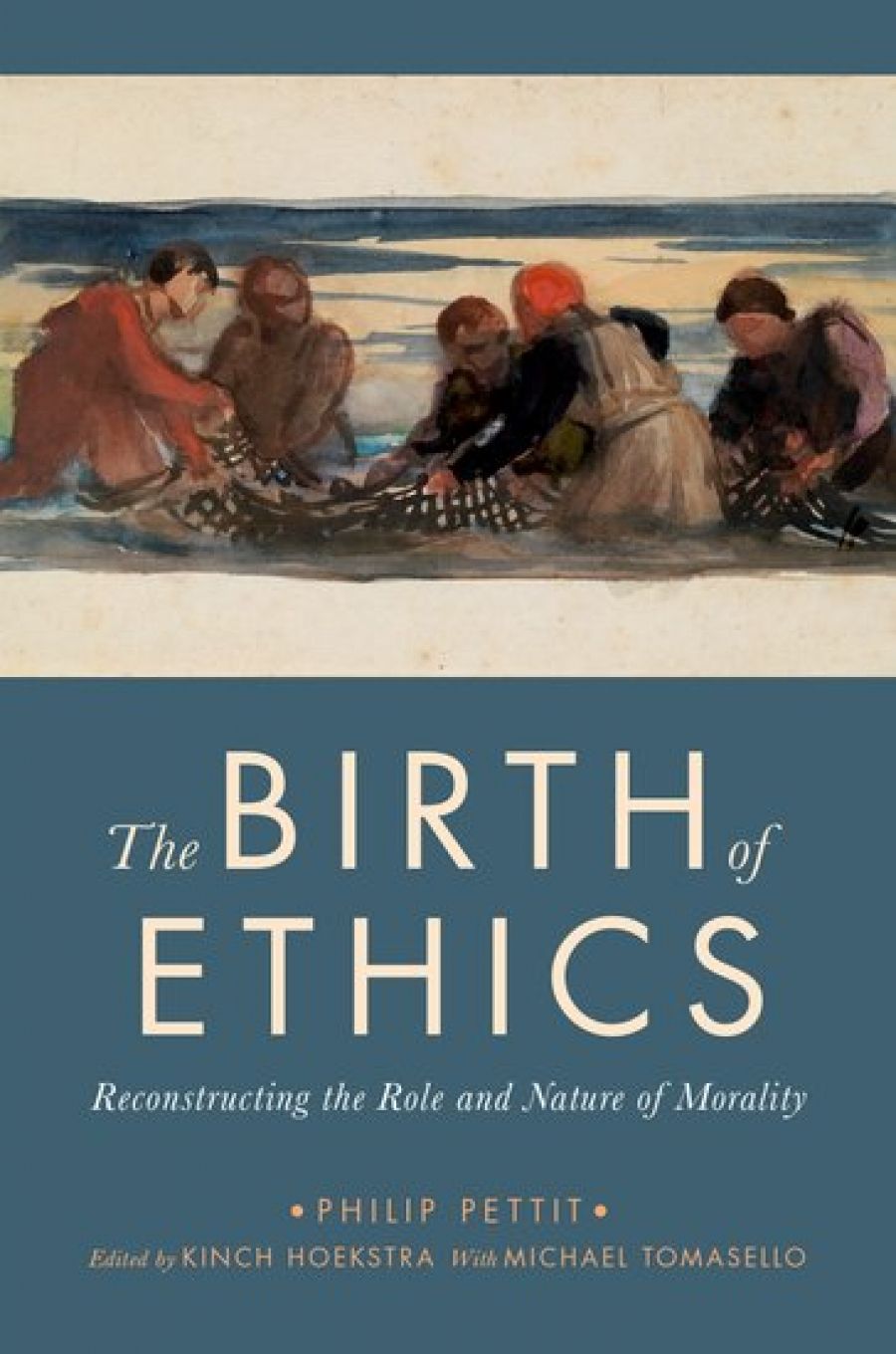
- Free Article: No
- Contents Category: Philosophy
- Review Article: Yes
- Custom Highlight Text:
The Birth of Ethics is a remarkably ambitious and innovative work by one of Australia’s most eminent philosophers. It is the full-length statement of an argument originally set out in Philip Pettit’s 2015 Berkeley Tanner Lectures on Human Values. The aim of the book is to ‘offer an account of ethics …
- Book 1 Title: The Birth of Ethics
- Book 1 Subtitle: Reconstructing the role and nature of morality
- Book 1 Biblio: Oxford University Press, $53.95 hb, 393 pp, 9780190904913
Historically, the sovereignty of moral obligation over other kinds of reasons has typically been anchored in something radically outside our empirical experience of the world – the will of God, Platonic Forms, Kant’s noumenon. Naturalism prohibits any recourse to the unknowable and, for the most part, naturalists have concluded that universal moral truths cannot be constructed from purely terrestrial materials. Naturalist moral philosophy has espoused views ranging from wholesale moral scepticism to various strategies for reinterpreting ordinary moral language so as to drain it of its apparent metaphysical pretensions. For example, claims that some action is right or obligatory or unconscionable are recast, not as assertions of fact, but as semantically disguised expressions of subjective emotional responses.
The strategic gambit of The Birth of Ethics is to break with the traditional philosophical method of conceptual analysis and to approach the explanation of morality as a task of speculative reconstruction. The standard analytical approach takes hold of a moral concept and dismantles it, inevitably discovering, among the disassembled parts, some metaphysical contraband. Pettit’s reconstructive method, by contrast, is essentially an exercise in storytelling, which he calls ‘counterfactual genealogy’. We are offered a kind of ‘just-so’ story; that shows how moral concepts, practices and, ultimately, a moral reality could have emerged from the primitive communicative practices of a pre-moral society.
 Philip Pettit (photograph via Australian National University)
Philip Pettit (photograph via Australian National University)
An example of this kind of counterfactual genealogy is the familiar story about the emergence of money in barter societies. To overcome the impracticalities and inefficiencies of barter, one commodity (precious metal) becomes a universal measure of exchange value, and so becomes a means of storing fungible abstract value, and thus money is born. In fact there probably were no barter societies of the form imagined in economic textbooks, but this historically inaccurate story is, nevertheless, a useful device for understanding the nature of money.
In this sense, Pettit’s explanation of the origin and development of ethics takes the form of an instructive fiction. The story begins in Erewhon, a hypothetical, pre-moral community. The name of this community is borrowed from Samuel Butler’s anonymously published 1872 novel Erewhon (an anagram of nowhere), which satirised Victorian society. The inhabitants of Pettit’s Erewhon possess a language adequate to describe their world, but they have no normative concepts of any kind. They exchange useful information with one another about their world. False information, when relied on, leads to wasted effort and can even be dangerous. Everyone, then, has a natural interest in developing a reputation as a person whose information is reliable. So the people of Erewhon hit on a method of promoting a general tendency towards truth-telling by leveraging the reputational consequences of truth and lies. They develop an incipient form of promising that enables speakers to voluntarily raise the social cost of misleading others, and thus to generate trust in what they say.
This is the first episode in a story that leads, by a series of plausible steps, to the emergence of concepts of responsibility. The actual origin story of ethics is, doubtless, far messier and less linear than this tale of how the Erewhonians built a scaffold from the ground of simple declarative language, floor by floor, to a suite of moral concepts and practices resembling ours. Pettit’s aim is to show that we can learn a good deal about what ethics is from this idealised account of how it might have developed.
The ultimate success of a book that seeks to change the methods of moral philosophy can only be judged many years after publication. The Birth of Ethics aims to clear a tenable path that leads away from moral scepticism, and for that reason, I believe, it deserves attention.


Comments powered by CComment